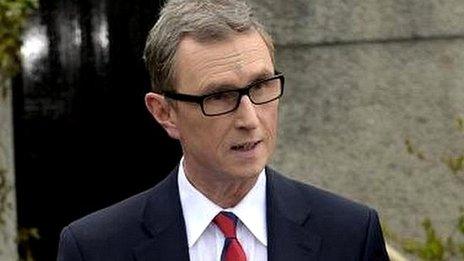Alison Saunders: CPS 'was right to take Evans case to court'
- Published
Director of Public Prosecutions, Alison Saunders, said it was important not to ''shy away'' from difficult cases
The director of public prosecutions has said the Crown Prosecution Service was right to take the Nigel Evans sex abuse case to court.
Alison Saunders said the CPS was not "on a mission" to pursue famous people and insisted it would not "shy away" from difficult cases.
Former Commons deputy speaker Mr Evans was cleared of nine sex abuse charges.
Calls have since been made for a review of some judicial processes, with claims his case should not have gone to court.
Former director of public prosecutions Lord Macdonald warned that prosecutors needed to "keep a cool head" in investigations of historical abuse cases.
'Star-struck'
Lord Dobbs tells 5 live: "Too many people are jumping on the celebrity bandwagon"
Without commenting directly on Mr Evans's case, he told the Times that prosecutors should avoid "going on a mission" and losing perspective.
But Ms Saunders rejected suggestions the CPS was "star-struck".
She told the BBC: "We apply the same test no matter who the offender or the victim is, and it's very important that we do that."
She said she would look at the Evans case to see if lessons could be learned - as was normal with all acquittals - but she rejected any widespread change to CPS procedures in such cases.
"I think we made the right decision in taking it before the court," Ms Saunders said.
"We looked at all the evidence and decided there was a realistic prospect of conviction. And what we have to remember is that juries apply a very different, much higher test which is, are they satisfied beyond all reasonable doubt?"
She insisted the CPS would continue to take difficult cases to court provided they satisfied its test.
'Losing perspective'
The head of the CPS in north west England, where Mr Evans serves as MP for Ribble Valley, backed Ms Saunders' remarks.
Nazir Afzal told BBC North West Tonight: "We don't care who the complainant is, we don't care who's being complained against, we look at the evidence.
"The evidence is what drives us... and we allow ultimately only those cases where there's a realistic prospect [of a conviction] to go to court."
Their comments followed Lord Macdonald's warning.
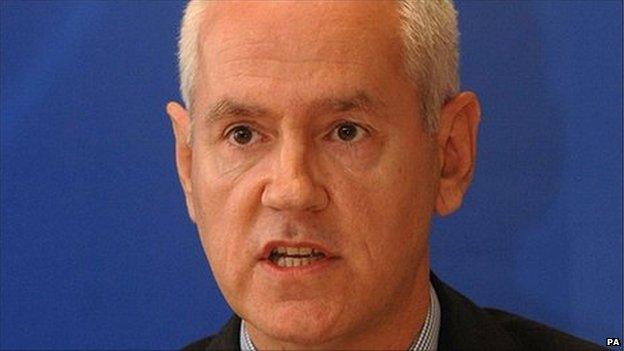
Lord Macdonald said cool heads were needed for dealing with historical cases
He said prosecutors should not only bring "sure-fire winners" to court - that "challenging" cases needed to be prosecuted too.
"What the CPS needs to avoid, however, is going on a mission and losing perspective," he said.
"This particularly applies to historical cases which have garnered a lot of publicity. You have to keep a cool head."
Lord Macdonald also told the Daily Telegraph, external the CPS had to be "very careful to avoid a situation where they regard a series of weak cases as amounting to a strong case".
The CPS has maintained it was right that all the evidence in the case of Mr Evans was put before a jury, but added that it respected the court's decision to clear him of all the charges.
But some MPs have criticised the CPS and police after Mr Evans's acquittal.
Conservative MP David Davis, a former shadow home secretary, called for an urgent review, saying there was "a risk of a serious injustice" under the current system.
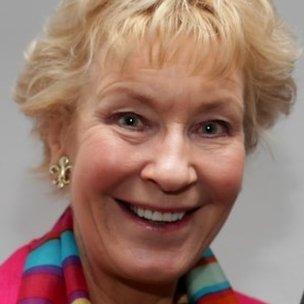
Christine Hamilton says questions on CPS costs need to be answered
Mr Davis said: "This case has highlighted serious concerns over how the police and the Crown Prosecution Service bring sexual offence cases to court.
"In particular we must now review the process whereby the police and the Crown Prosecution Service put together a large number of lesser, subsidiary cases in order to reinforce one serious case when prosecuting sexual offences."
Christine Hamilton, wife of former Conservative MP Neil Hamilton, accused the CPS of wasting taxpayers' money.
Mrs Hamilton and her husband were arrested in 2001 by police investigating an allegation of rape which turned out to be entirely false.
Mrs Hamilton told the BBC she believed the CPS and police were on a mission to target high-profile figures because they felt "guilt-ridden" in the wake of the Jimmy Savile inquiry.
She said there had been a "mini torrent" of arrests, which had wasted money and "destroyed" lives, including Mr Evans's.
"How much has this cost? And could that money not be better spent by the CPS and the police in pursuing real criminals?" she said.
Mrs Hamilton said there had been "two or three" witnesses who did not consider themselves "victims".
"The CPS, if they knew that, why on earth did they bring these people to court?" she added.
'Failing victims'
But director of public prosecutions Ms Saunders said research had found that victims did not always see themselves as victims, citing domestic abuse as an example.
She said the CPS prosecuted more than 730,000 cases each year and had a conviction rate of 86%.
"If a case satisfies the evidential test and it's in the public interest to prosecute it, we will prosecute," she said.
"And it would be wrong and we would be rightly criticised if we didn't take cases just because we were being overly cautious and we would be failing in our duty to victims and society."
Mr Evans was cleared of a string of sex abuse charges, including one of rape.
The rape claim was among several allegations made by seven men during a five-week trial at Preston Crown Court.
Mr Evans was said to have used his political influence to take advantage of his alleged victims but the defence pointed out inconsistencies in various witness accounts.
The former Conservative MP, 56, currently sits as the independent member for Ribble Valley.
- Published10 April 2014
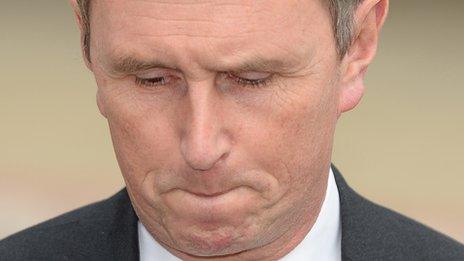
- Published10 April 2014
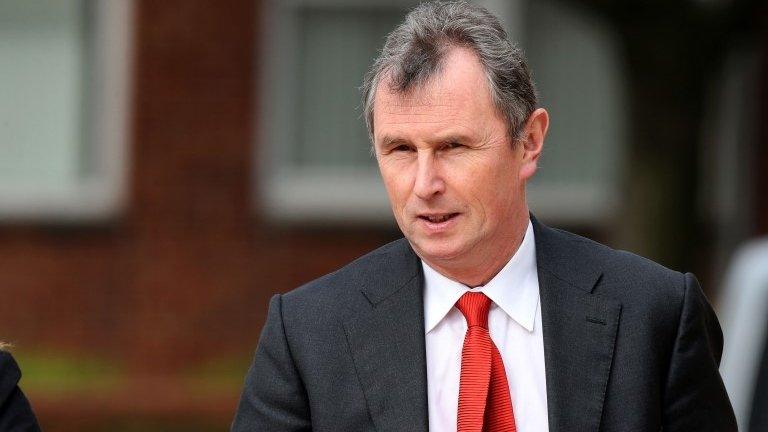
- Published10 April 2014
